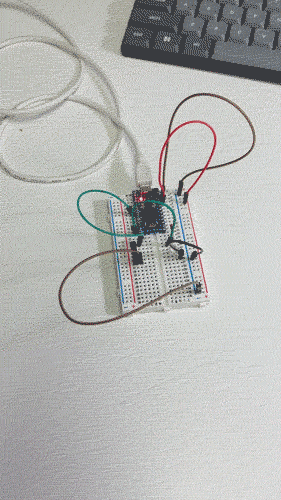Brian's HTMAA Diary 2024
Week 02: Embedded Programming
For Embedded Programming week, I decided to add a feature to a previous project I had worked on. In this project, I made box with ears that people could speak to, which then recites a poem written by OpenAI when the lid of the box is opened. One thing that I was critiqued for was not having indication of when the box is ready to be opened. I decided to see if I could trigger an LED when the box can be opened.
I started of with wiring up a blink test to see if all my electronics work.

Here is the code for controlling the microprocessor:
#import
const int buttonPin = 2; // the number of the pushbutton pin
const int reedPin = 3;
const int ledPin = 9;
int incomingByte;
// variables will change:
int buttonState = 0; // variable for reading the pushbutton status
int reedState;
int DL = 300;
void setup() {
Serial.begin(115200);
// initialize the pushbutton pin as an input:
pinMode(buttonPin, INPUT);
pinMode(reedPin, INPUT_PULLUP);
pinMode(ledPin, OUTPUT);
}
void loop() {
// read the state of the pushbutton value:
buttonState = digitalRead(buttonPin);
reedState = digitalRead(reedPin);
// check if the pushbutton is pressed. If it is, the buttonState is HIGH:
if (buttonState == HIGH) {
Keyboard.press(0x20);
Serial.println("BUTTON DOWN");
delay(DL);
}
else {
Keyboard.release(0x20);
}
if (reedState == HIGH) {
Serial.println("TOP OPEN");
delay(DL);
}
if (Serial.available() > 0) {
// read the oldest byte in the serial buffer:
incomingByte = Serial.read();
if (incomingByte == '1') {
digitalWrite(ledPin, HIGH);
}
if (incomingByte == '0') {
digitalWrite(ledPin, LOW);
}
}
}
The lifting of the box lid is triggered by a reed switch. When the LED is switched on, the poem is ready to be recited. However, the poem will only recite when the LED is on and the reed switch is triggered. Here is a video of how it works:
import numpy as np
import os
import serial
import sounddevice as sd
import sys
import tempfile
import time
import warnings
from pynput import keyboard
from scipy.io.wavfile import write
from faster_whisper import WhisperModel
from openai import OpenAI
from pathlib import Path
from playsound import playsound
warnings.filterwarnings("ignore", category=DeprecationWarning)
class WhisperTranscriber:
def __init__(self, model_size="large-v3", sample_rate=44100):
self.model_size = model_size
self.sample_rate = sample_rate
self.model = WhisperModel(model_size, device="cuda", compute_type="float16")
self.is_recording = False
def on_press(self, key):
if key == keyboard.Key.space:
if not self.is_recording:
self.is_recording = True
print("Recording started.")
def on_release(self, key):
if key == keyboard.Key.space:
if self.is_recording:
self.is_recording = False
print("Recording stopped.")
return False
def record_audio(self):
recording = np.array([], dtype='float64').reshape(0, 2)
frames_per_buffer = int(self.sample_rate * 1)
with keyboard.Listener(on_press=self.on_press, on_release=self.on_release) as listener:
while True:
if self.is_recording:
chunk = sd.rec(frames_per_buffer, samplerate=self.sample_rate, channels=2, dtype='float64')
sd.wait()
recording = np.vstack([recording, chunk])
if not self.is_recording and len(recording) > 0:
break
listener.join()
return recording
def save_temp_audio(self, recording):
temp_file = tempfile.NamedTemporaryFile(delete=False, suffix='.wav')
write(temp_file.name, self.sample_rate, recording)
return temp_file.name
def transcribe_audio(self, file_path):
segments, info = self.model.transcribe(file_path, beam_size=5)
print ("Detect language '%s' with probability %f" % (info.language, info.language_probability))
full_transcription = ""
for segment in segments:
# print(segment.text)
full_transcription += segment.text + " "
os.remove(file_path)
return full_transcription
def run(secretRecording, _assistant):
print ("Hold the spacebar to start recording...")
try:
while True:
recording = secretRecording.record_audio()
file_path = secretRecording.save_temp_audio(recording)
thread = client.beta.threads.create()
secretTranscription = secretRecording.transcribe_audio(file_path)
print(secretTranscription)
messages = client.beta.threads.messages.create(
thread_id=thread.id,
role="user",
content=secretTranscription,
)
assistant_run = client.beta.threads.runs.create_and_poll(
thread_id=thread.id,
assistant_id=_assistant.id,
instructions="Please write a very very short poem about the secret the user submitted"
)
if assistant_run.status == 'completed':
messages = client.beta.threads.messages.list(
thread_id=thread.id
)
poem = messages.data[0].content[0].text.value
print(poem)
speech_file_path = Path(__file__).parent / "speech.mp3"
response = client.audio.speech.create(
model="tts-1",
voice="onyx",
input=poem,
)
arduino.write(b'1')
response.stream_to_file(speech_file_path)
while True:
while (arduino.inWaiting()==0):
pass
dataPacket=arduino.readline()
dataPacket=str(dataPacket,'utf-8')
dataPacket=dataPacket.strip('\r\n')
if (dataPacket == "TOP OPEN"):
print(dataPacket)
playsound('speech.mp3')
os.remove('speech.mp3')
arduino.write(b'0')
break
else:
print(assistant_run.status)
except KeyboardInterrupt:
print("Interrupted")
sys.exit(0)
if __name__ == "__main__":
OPEN_AI_API_KEY = os.getenv("OPENAI_API_KEY")
client = OpenAI(api_key = OPEN_AI_API_KEY)
#instantiate arduino
arduino = serial.Serial('COM6',115200)
#wait for arduino to initialize
time.sleep(1)
assistant = client.beta.assistants.create(
name="Poem Assistant",
instructions="You are a poet that is told a secret. Write a short poem about the main themes in the secret",
# tools=[{"type": "code_interpreter"}],
model="gpt-4-turbo-preview",
)
transcriber = WhisperTranscriber()
run(transcriber, assistant)